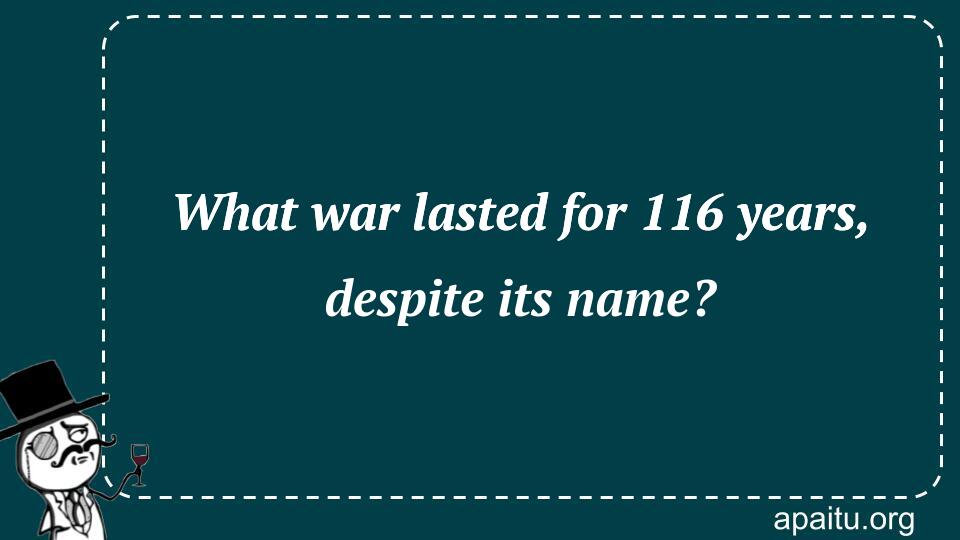Question
Here is the question : WHAT WAR LASTED FOR 116 YEARS, DESPITE ITS NAME?
Option
Here is the option for the question :
- Six-Day War
- War of 1812
- Hundred Years’ War
- Thousand Days’ War
The Answer:
And, the answer for the the question is :
Explanation:
The Hundred Years’ War, despite its name, lasted 116 years, beginning in 1337 and ending in 1453. The war started from a dispute over the succession to the French throne.

The Hundred Years’ War is a historical conflict that defied its name, lasting for a staggering 116 years. In the annals of warfare, this protracted struggle between England and France holds a significant place, shaping the political and cultural landscape of Europe during the 14th and 15th centuries. In this article, we delve into the complexities and enduring impact of the Hundred Years’ War, exploring the factors that fueled the conflict and the consequences it had on the nations involved.
The origins of the Hundred Years’ War can be traced back to the complex web of dynastic rivalries, territorial disputes, and economic tensions that existed between England and France. The conflict officially began in 1337 when King Edward III of England, laying claim to the French crown, declared war on King Philip VI of France. The war was characterized by a series of military campaigns, sieges, and battles, punctuated by periods of truce and diplomatic negotiations.
The Hundred Years’ War witnessed significant military developments and strategic shifts. It marked the transition from traditional feudal warfare to a more organized and professional military system. Longbow archers, for example, played a crucial role in the English forces, showcasing the effectiveness of ranged warfare against heavily armored knights. The war also witnessed the rise of famous military leaders, such as Edward the Black Prince and Joan of Arc, who left a lasting impact on the conflict.
The war’s duration was influenced by a myriad of factors. One key aspect was the intermittent nature of the conflict, with prolonged periods of relative peace interspersed between intense military campaigns. Additionally, the war was marked by complex political dynamics, including changing alliances, internal conflicts within both England and France, and succession crises, which prolonged the hostilities.
The Hundred Years’ War had far-reaching consequences for both England and France. In England, the war had a significant impact on the nation’s finances, as the costs of maintaining armies and conducting campaigns strained the royal treasury. This led to the imposition of heavy taxes and, eventually, social and political unrest. The war also contributed to the decline of the feudal system in England, as the need for a more centralized and professional military force emerged.
In France, the war had profound implications for the nation’s unity and sense of identity. The conflict witnessed the rise of nationalism, as the French rallied around the idea of defending their homeland against the English invader. The war also exposed the weaknesses and divisions within the French monarchy, leading to power struggles and civil unrest. However, over time, the French were able to regroup and drive the English forces out of their territories, ultimately solidifying their control over the nation.
The Hundred Years’ War also left a lasting impact on European warfare and the concept of nationhood. The war’s protracted nature highlighted the importance of diplomacy, alliances, and economic resources in sustaining a conflict of such magnitude. It also spurred advancements in military technology and tactics, as both sides sought innovative ways to gain an advantage on the battlefield.
the Hundred Years’ War stands as a monumental chapter in European history. Lasting for 116 years, despite its name, this extended conflict between England and France shaped the political, military, and cultural landscape of the time. It showcased the evolution of warfare, the rise of nationalism, and the complexities of power struggles within and between nations. The legacy of the Hundred Years’ War serves as a reminder of the enduring impact that historical conflicts can have, shaping the course of nations and leaving a lasting imprint on the world.